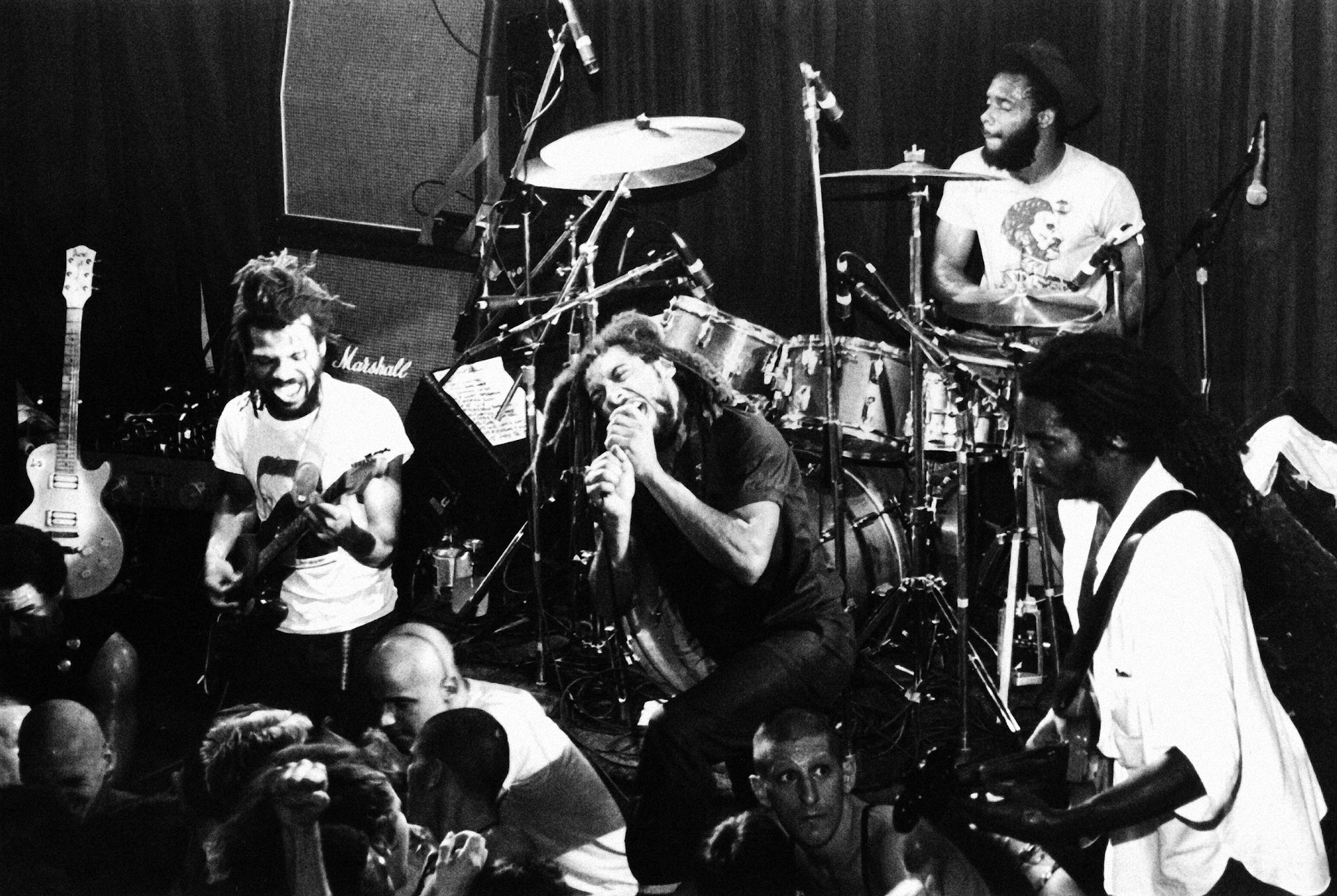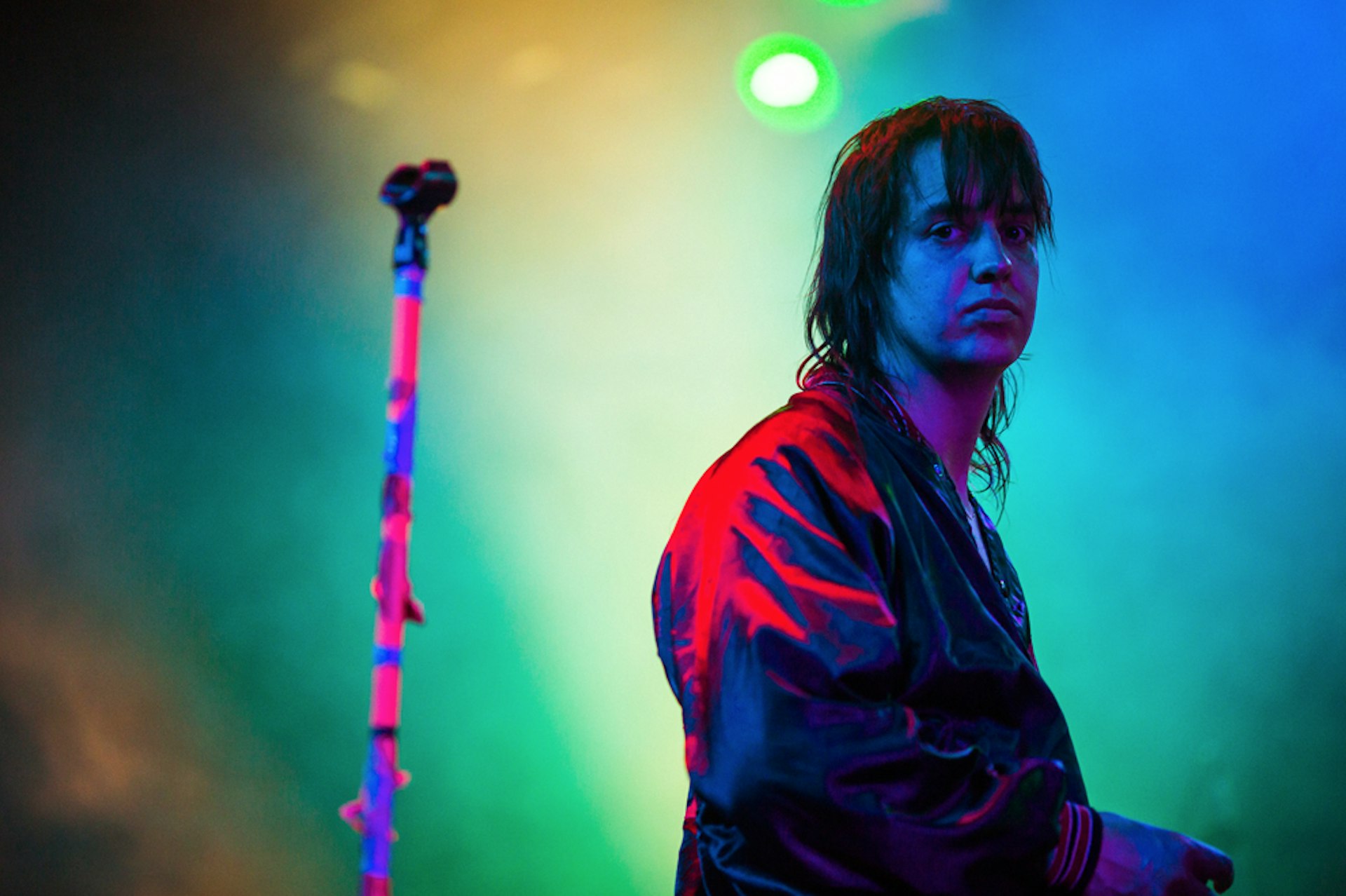
Four hours in Philadelphia with Julian Casablancas
- Text by Erick Lyle
- Photography by Bryan Derballa
“This is bullshit,” says Bryan Derballa, the photographer, for the fifth time in ten minutes. “Straight up bullshit.”
We’re sitting in the parking lot outside The Electric Factory in Philadelphia, having driven for two hours from Brooklyn to make our scheduled meeting time of 2.30pm. “We’ll have to stop the interview dead on 4.30pm,” came the instructions from Julian Casablancas’ people. It’s now nearly 5pm.
Casablancas is in Philly to kick off a tour with his new band, the epicly self-titled Julian Casablancas + The Voidz, in support of their debut album.
The tour manager sends me an email. “I’ll be arriving with JC – we’re running a bit behind. Will give you an ETA once we’re on the road.” (In the hours that follow, Casablancas will be referred to as “JC” in four apologetic dispatches. As in, “I’m with JC at a rest stop in New Jersey. We will be there soon!”).
We park next to two full-size tour buses, where some long-haired, unshaven men who I recognise from the band’s videos as members of The Voidz are loading up piles of luggage. The parking lot provides an instructive vantage point from which to behold the galaxy of endeavour Casablancas has set in motion — a whirlwind that seems entirely unaffected by his current physical absence from its centre. Through the back doors of the venue, the band’s gear is visible onstage and a crew of sound men rush around taping down cables. A group of maybe twenty girls who look too young to have seen The Strokes the first time round are already lined up out front waiting for Casablancas. I sit and read today’s latest Casablancas interview on my phone while Bryan and his assistant pace the parking lot, gauging light and shadow.
By the second hour, a shipping unit of Voidz tour T-shirts has been delivered, several pallets tall and bound in yards of shrink wrap. In the third hour, another email arrives — “JC and I are almost there! “ — reminding me that Casablancas shares initials with another famous no-show. As the fourth hour approaches, the sun is setting, foreclosing all possibility of natural outdoor photos, and Bryan is talking about leaving.
But then, something happens. From around the corner and into this decidedly unglamorous stretch of industrial north Philadelphia comes a gigantic Winebago. It has been painted black with a matte finish and on the grill is mounted a skull of a longhorn bull. The windows are tinted and it is impossible to see inside. I try to picture the vehicle at a New Jersey rest stop. The girls at the front of the venue peek around on tippy toes as the vehicle slows to a stop. The Voidz get up from their resting place on the steps of the tour bus. But Casablancas’ private tour vehicle just sits in silence, entirely self-sufficient, while all present wait to see who or what will get out. Five full minutes, then the door slides open, and Casablancas appears, groggy and rubbing his eyes, as if he just got up from a long nap.
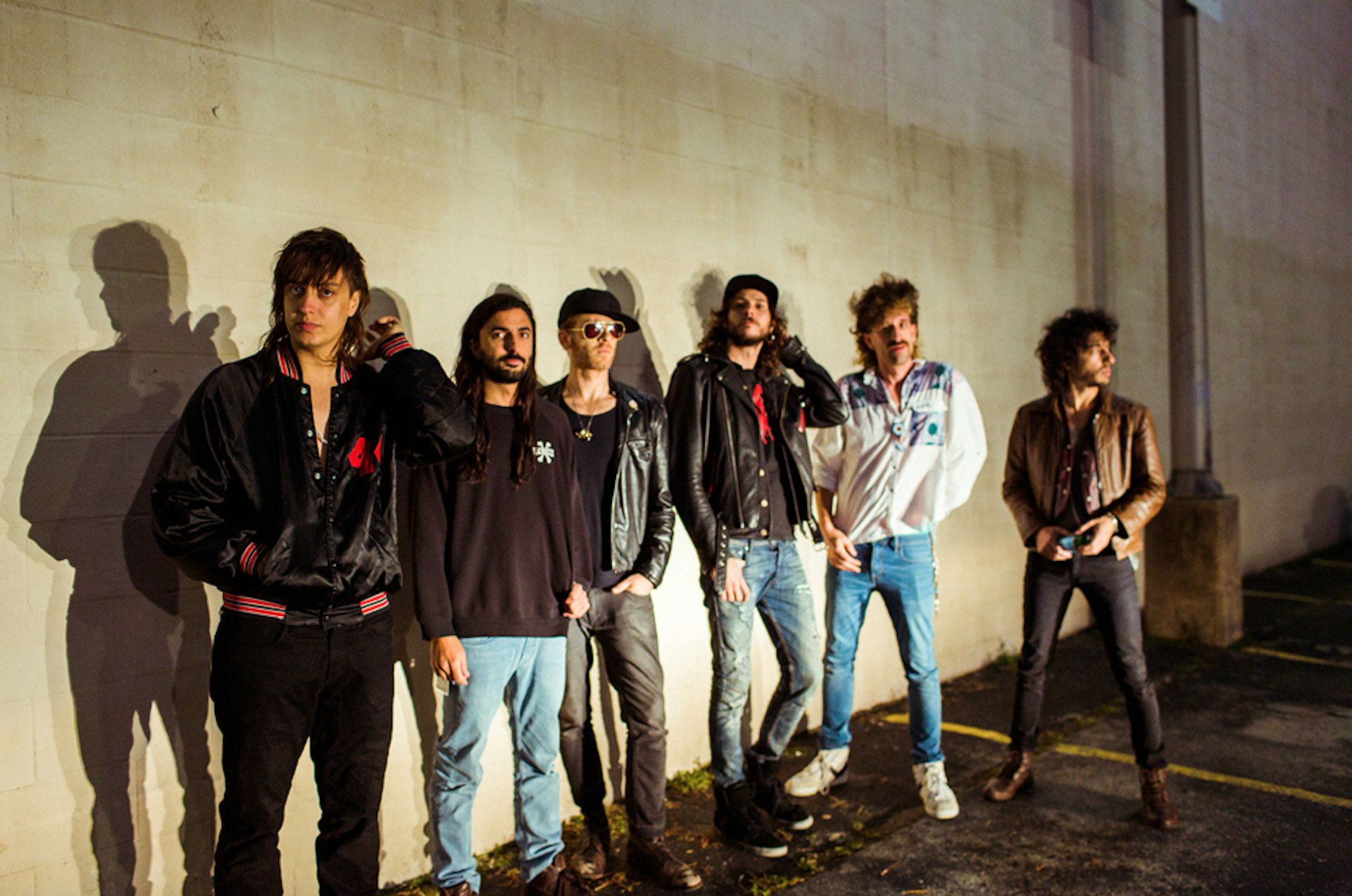
***
Julian Casablancas wants to be taken seriously. No longer content to simply be considered one of the great songwriters of his generation, Casablancas has ditched the punchy, direct, and salacious power pop exuberance of early Strokes singles like ‘Last Night’ to record the Voidz debut album, Tyranny, which he describes as his first “protest record”. The sprawling collection of songs veers wildly from hardcore punk to afro-pop to horror synth to metal – often in the same song, many of which average over six minutes in length. Casablancas told a reporter this month that the record is “music from the future.”
While we expect no less than towering excess from rockstars, nothing generates more excess than a rockstar who longs to be taken seriously. The first single from the new record, ‘A Human Sadness’, tops eleven minutes, and from what he says in interviews, one senses that Casablancas almost wishes it could have been twice as long, so great seems his desire to confound expectations. The excess of the music is but a small part of the network of human activity set in motion by Casablancas’ desire to rebrand. This succession of events included an appearance at SXSW that left audience members scratching their heads, the release of a promotional Voidz cigarette lighter complete with a hard-drive containing the record, the inevitable top secret show at a Brooklyn warehouse space, the world premier of two videos, and almost daily coverage on media sites like Noisey, Pitchfork and Stereogum.
The activity surrounding Casablancas has on this day generated such gravity that even myself and a photographer have been drawn into the JC orbit. We have driven two hours from Brooklyn to Philadelphia to meet Casablancas for a cover story. Julian Casablancas is four hours late.
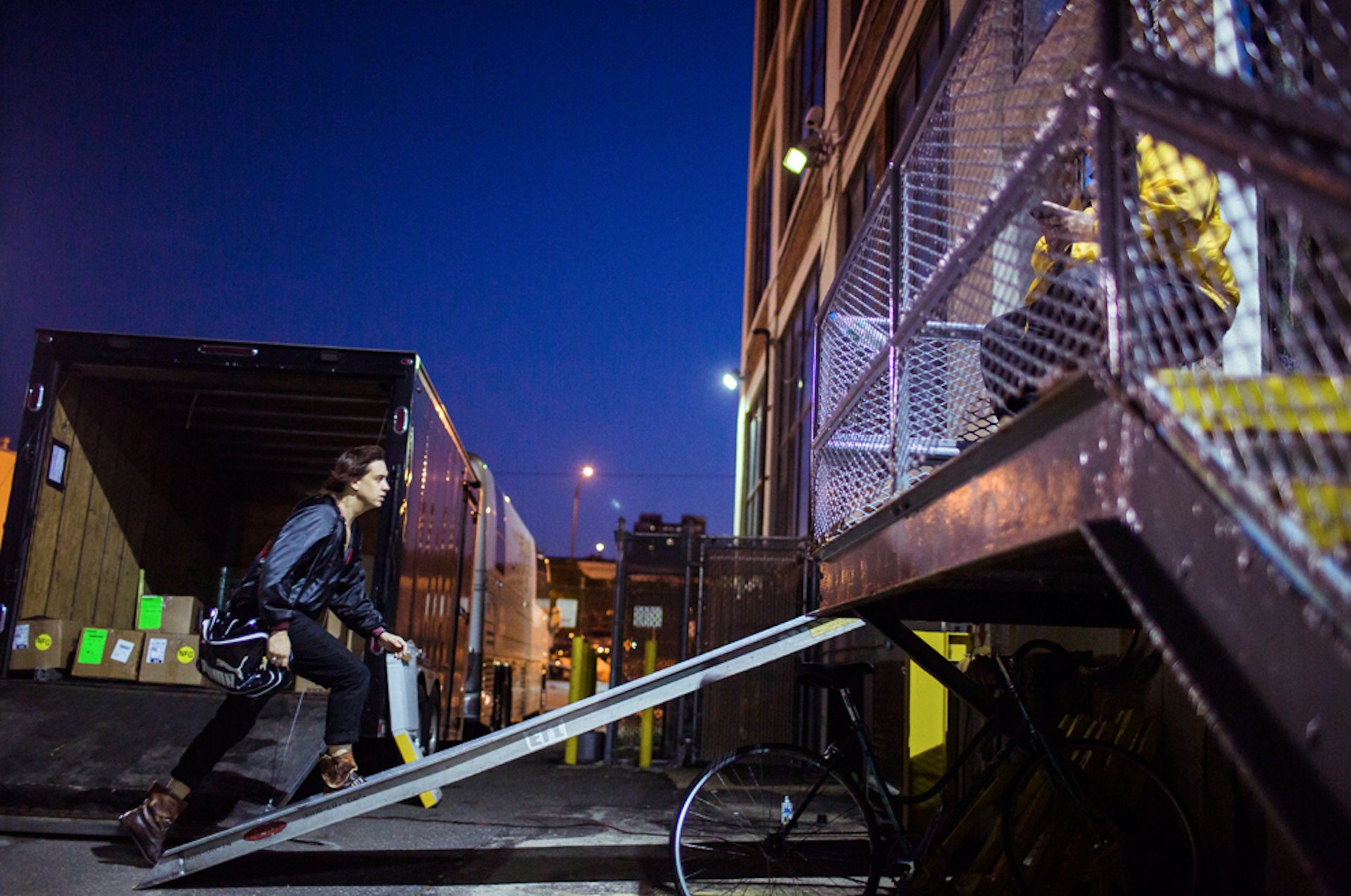
The Protest Record
“I’m sorry I made you wait, man, the first day of tour is always crazy.”
Casablancas and I have adjourned to a private room backstage after sound check. After blowing us off all day, Julian is now warm, abashed. He mumbles an apology and looks up at me from the couch with the playfully mournful expression of a child who is about to be admonished in public.
“Go gentle on me, okay?” he says.
We kick things off with the obvious subject, Tyranny — and what he means by calling it his “protest record”.
“I always say it’s ‘kind of’ a protest record’,” he laughs. “I mean, it’s universal… It’s not all about election ’08, or whatever… I feel like I’m sounding interview modey. Bear with. I’ll try my best.”
He pauses then finds his stream. “For me there is a parallel between quality in music and truth in politics. I think both are repressed and hard to find. The powers of money counter those forces of quality in music and truth in politics. In music my main goal is to try and take stuff that is hopefully edgier and weirder but make it mainstream. I think I’ve tried to do that since forever. I was talking about this with a friend recently — the fact that talking about popular things in your own time is just ’interesting’ but talking about repressed things in the past is somehow more ‘fascinating’. I don’t understand that.”
This tension between underground cool and mainstream accessibility — or more specifically, the nostalgia the mainstream has always felt when the underground is unearthed and commodified — is what animated the early career of The Strokes. On their first LP, Is This It, The Strokes merged a two-chord guitar boogie cribbed from Lou Reed’s Velvet Underground with slick new-wave keyboard parts and up-to-date production. The short, punchy songs were animated by Casablancas’ breathy singing, a style which often resembled the crooning of a 1950’s teen idol.
Updating the Velvets’ sound for a wider audience was the whole point, says Casablancas. “A band like Velvet Underground — how come they’re not the biggest band?” he says. “You live in the era and everyone is always kind of sweeping the good stuff and the truth under the rug and then thirty, fifty years later everyone’s like, ‘Oh, yeah of course that band was great!’ Or, ‘Of course slavery should have ended.’”
I ask Casablancas if he was moved toward protest in his music by the Occupy Wall Street movement. “Yeah sure. To me it was awesome in most ways,” he says. “Not having, like, leadership or a manifesto maybe hurt it. It became too broad and everyone could just jump on it.”
Did you go down to Zucotti Park and check it out? I peripherally ran into a lot of the protests around town, sure. I was writing about these things at the time so I was excited. But I’m in awe of the total illusion of the freedom of assembly. I find that pretty fascinating, that the police can just break up peaceful protest.
You’ve also spoken recently about your frustration with corporate power. It’s not corporations as such — it’s just, in the system I’m in, that’s who runs things. And it’s clear all the decisions are not what people want. It’s a subtle complex list of well-placed individuals and companies and donors and lobbyists. It’s that old thing that [Noam] Chomsky talks about: a president’s agenda will pretty much mirror their campaign contributions. To call it democracy doesn’t really make sense. For ninety-nine per cent of laws and issues that get passed, no one’s really paying attention.
Are you hoping to incite people to action with this record? I think awareness is a good start. I’ve been listening to Russell Brand a lot lately and he’s surprisingly very articulate. The only way you can change anything is if more people are aware of the complexity of what’s happening. So, yeah, at this point the best thing you can do is talk about it.
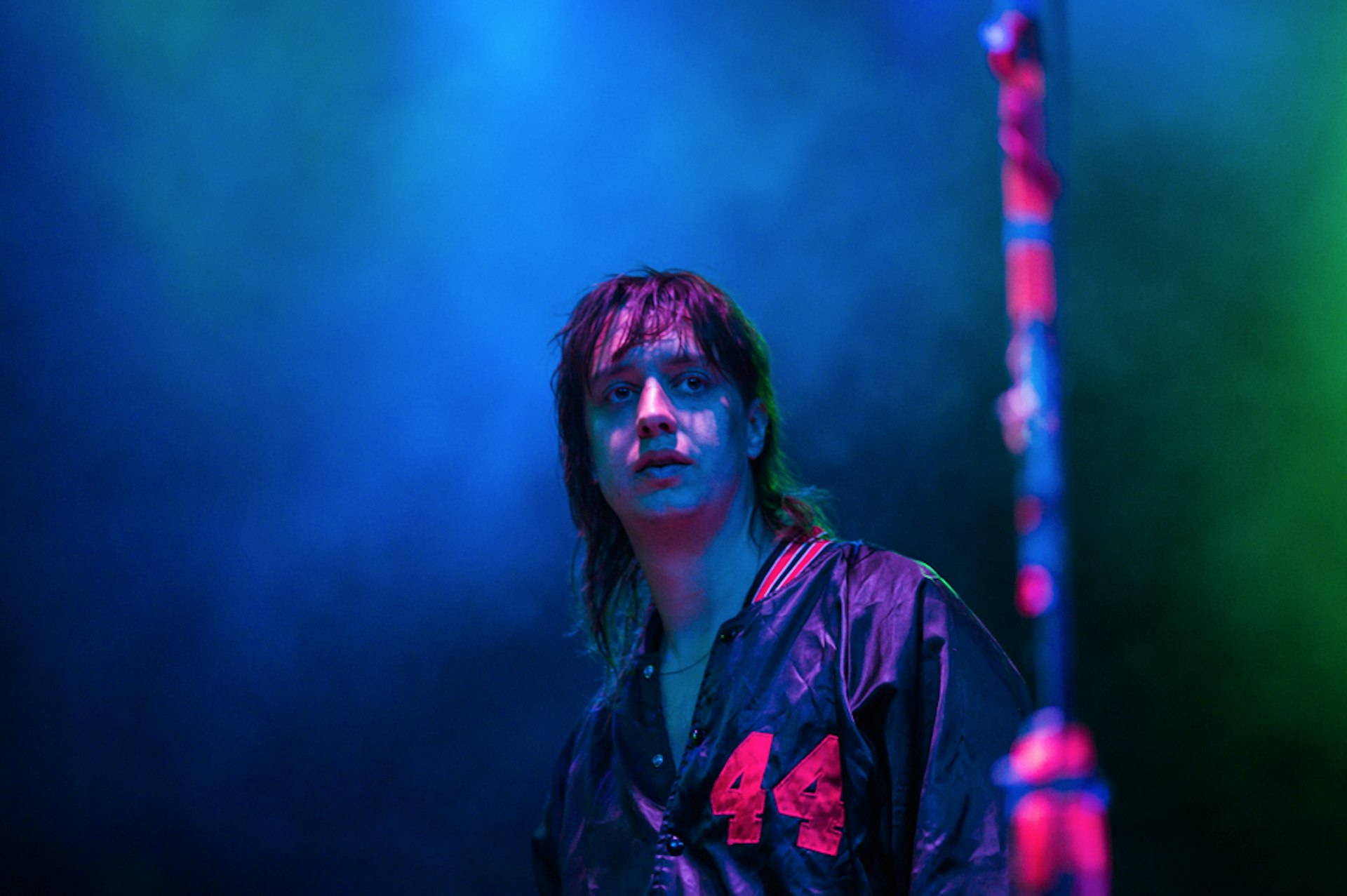
Post-9/11
Is This It, the Stroke’s debut, was released on September 11, 2001. Sounding at once old and new, the record bridged several eras of youth culture in New York City. Arriving at the tale end of Mayor Giuliani’s clean-up campaign, The Strokes sprang fully formed from a Lower East Side that was no longer the burned-out and dangerous refuge of the outsiders, queers, and freaks who invented punk rock and performance art. Between the ‘70s and ’90s, an astonishing amount of the major players in those scenes died in the AIDS epidemic and those who survived were priced out by the arrivistes who bought up the still cheap but newly safer real estate. Casablancas and the other members of the fashion-conscious Strokes had mostly met while teenagers at elite boarding schools in Europe. They famously showed up drunk to interviews and dated models and actresses. While their sound — and drug-fuelled rock star antics – may have paid homage to the city’s former transgressions, the band, in fact, could be seen as emblematic of the straight, white, well-heeled youth who only showed up to the Lower East Side post 9/11.
Today, as the memory of 9/11 fades and the city weathers waves of gentrification, Is This It seems both timeless and ancient, oddly prescient. The record captures the endlessly recurring Polaroid instant between when a place exposed as cool fades to ho hum. It is both the sound of a richer and safer city perpetually nostalgic for its former risky greatness and the excited anthem of each new fresh-faced generation that flocks here to find a kind of freedom in that city’s ruins.
I consider with Casablancas the unique position The Strokes occupy, between New York City’s present and its past.
It seemed like a lot of the success of The Strokes, initially, was that you guys represented something people longed for from the grittier city’s past. Revved-up rock, and that certain kind of ‘being cool downtown’ that wasn’t actually happening anymore. Yeah, I can see that. People always talk about ‘the scene’ back then, but I’m sure there’s more of a scene now. We hung out with other bands some of the time but it wasn’t like an ‘awesome scene’.
What was it from that older time the you were specifically trying to channel when you were starting out? Man, I don’t know if I was specifically trying hard to channel it — maybe it just subtly comes across. It’s probably the Velvet Underground’s influence. They were way ahead of their time – but were totally a commercial flop. Then ten years later all these bands came out. Television, the Talking Heads, New York Dolls, that whole era. I too am influenced by The Velvet Underground, but in like the //1990s//! I didn’t actually listen to Television or any of those bands, but the reason people hear that is because we all really liked The Velvet Underground… That’s where it comes from more than me being like, ‘Oh, it’s gotta be a New Yorky thing!’ I didn’t know much about the whole history.
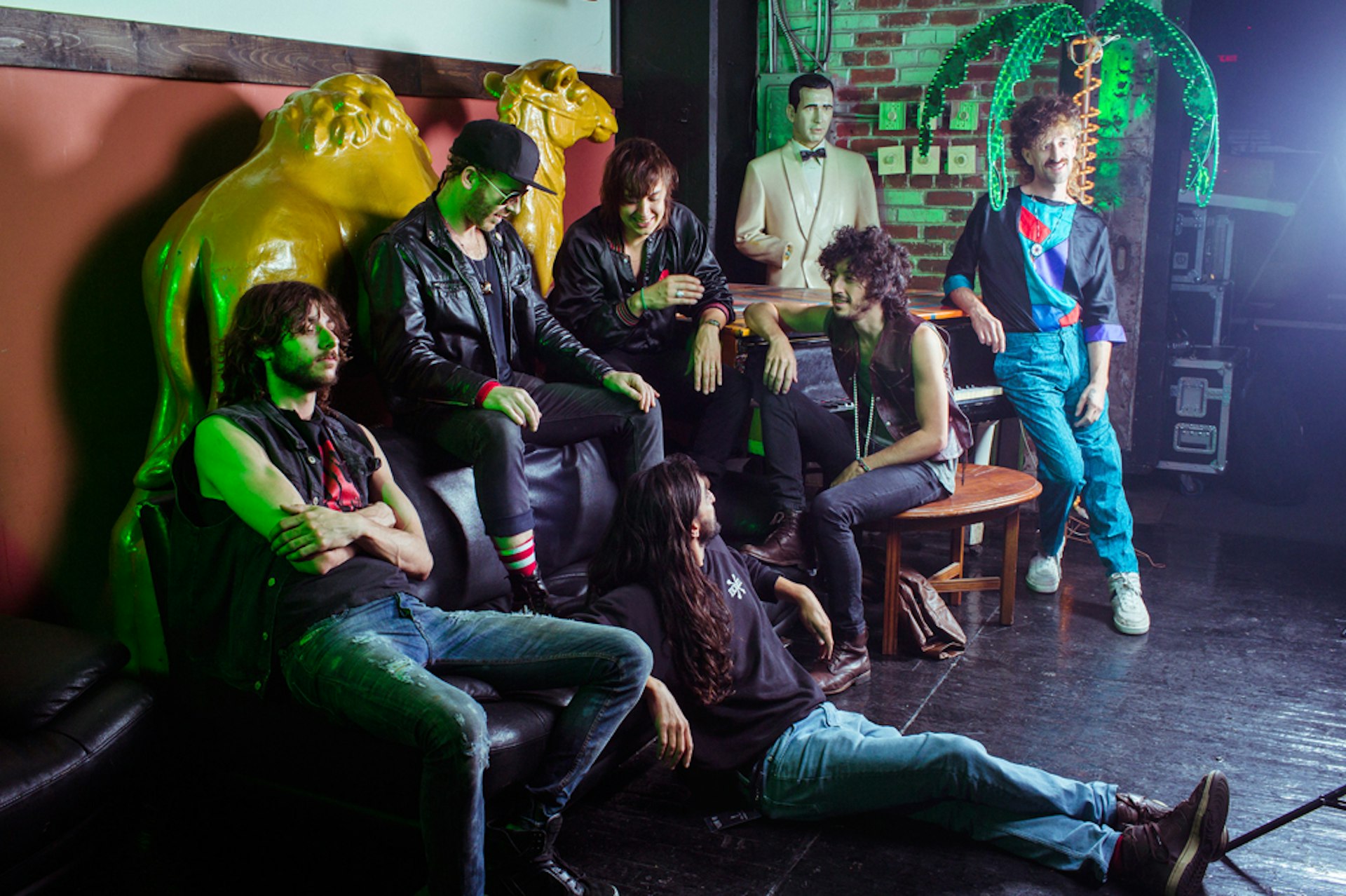
DIY vs. Corporate
While Casablancas has decried the influence corporations have over public policy, The Strokes came to prominence at the peak of youth culture’s corporate takeover. Where art and music in the city were once rooted in organically formed communities, like the artists and bands who hovered around CBGB’s or Warhol’s Factory, brands have now become the shapers of NYC scenes. Since the noughties, sponsored music festivals have become the norm and companies promote youth culture as a way of building brand loyalty. Looking back at the era when The Strokes rocketed to stardom, one remembers not so much the importance of other bands but the pivotal emergence of Vice magazine and the ubiquitous American Apparel ad.
With their 2013 LP, Comedown Machine, The Strokes ended their relationship with major label RCA Records, and now Casablancas has started his own label, Cult Records, which has released The Voidz’ debut. While Casablancas says he hopes any future Strokes releases will be on Cult, in one sense, the band’s association with RCA has continued, as Casablancas has hired RCA’s former president, Jack Rovner, who first signed The Strokes, to run his new indie label. “Jack has such a great business mind,” says Casablancas. “But it is never at the expense of art, and that is so rare.”
I ask Casablancas about the role corporations in our society also have in dictating what’s cool in youth culture. “Well, we are trying to counter that at Cult with some actual good taste,” he laughs.
You’re doing your own label now, Cult Records. Is that a reaction to corporate takeover? With Cult, for one thing, the record price can be cheap. That’s been a problem before. I think to work on music, on art, on the delivery — and then at the last second to just give it to someone who totally doesn’t understand what you’re doing — in the past that’s been a bummer. Also, people would show me awesome bands, or songs. Now if someone asks me for advice, I say, ‘Sure if you want to put it out we can do this thing.’ It was just a chance to figure out how to put out records our own way.
How did you come around to the idea that you wanted to take control? It’s the hope to have an outlet. It’s about trying to make every album, every song, the level of quality people can trust in. And to be a source for tastemakers. Like, every era has their TV, or iTunes. iTunes is such a negative force on music. So we’re just trying to counter that.
Why is iTunes so negative? Because people just go to iTunes to see what the new records are. And the best records are not there, so they’re buried. People think, ‘Oh, it doesn’t exist.’ But they just don’t know about it.
Do you put everything out on iTunes? I do. But they just bury everything we do. I mean, I guess we don’t sell well. [Laughs]
The Strokes have done some commercial work in the past — a Ford car commercial, Converse shoe stuff. Is that stuff you would feel differently about now? I probably would, to be honest. It’s a fine line, because in this day and age, for musicians, that’s the main way to get paid now. Selling out — is that even a thing now? I guess it depends on the company. If it’s something that’s bad, your integrity is important. But if it’s going to give you so much money that you can help promote integrity in the long run, I don’t know…
What would be too much for you? Too much? Like an Exxon Mobile ad or something? In general, advertising freaks me out. The way they twist at your heart. These commercials where, like, someone’s saving a baby and you’re like crying. It’s pretty insane. But the best artists are doing commercials. They offer you two million and I’m like, ‘Where do I sing and dance!’ [Laughs]
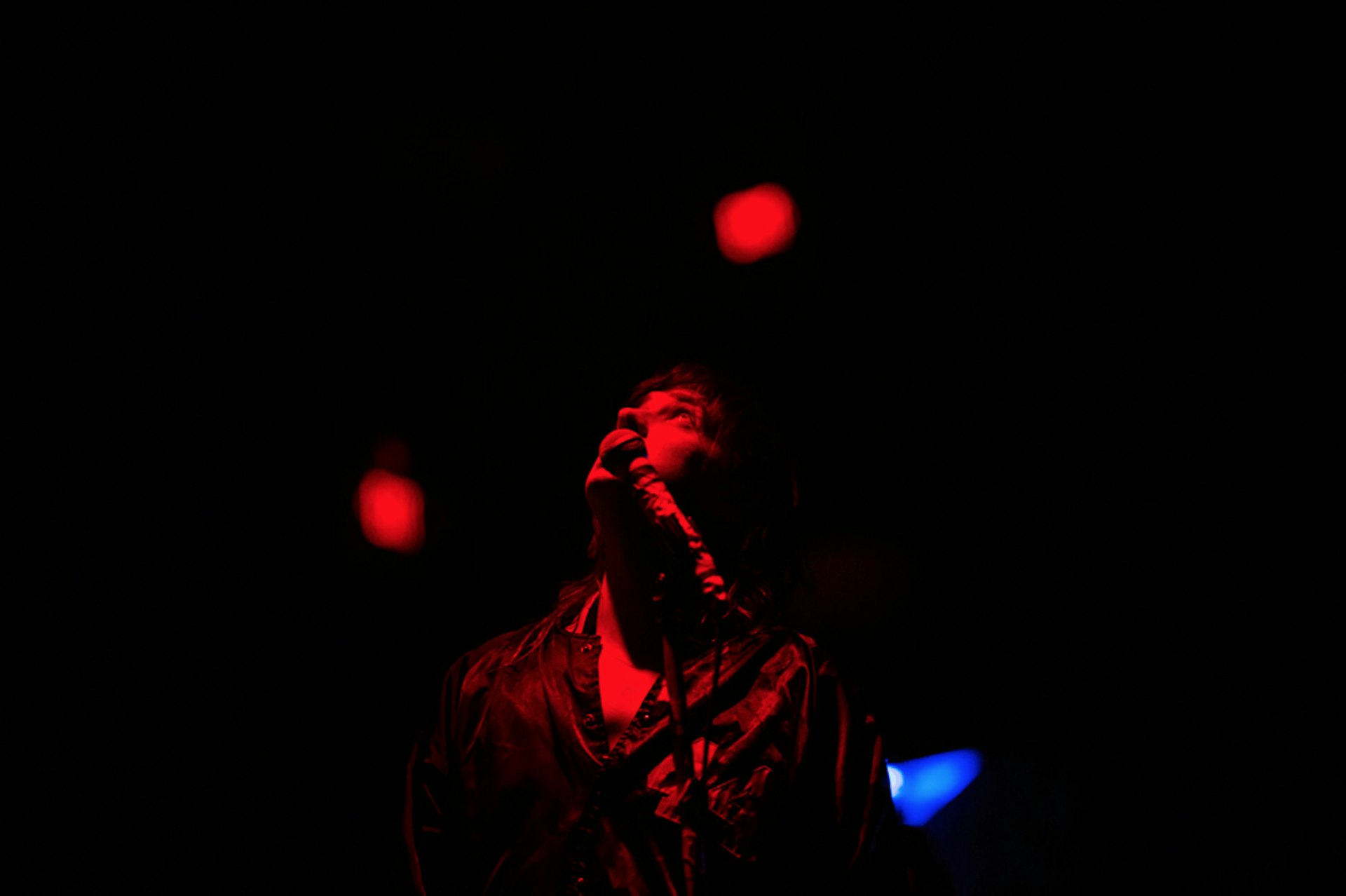
The Insurrection
In interviews for the new record, Casablancas has called freedom of speech in the United States “a lie” and has spoken out about corporate control of public life. Yet, The Strokes managed to be highly visible through the post 9/11 era and the run up to the USA invasion of Iraq without saying a peep about President Bush’s policies. Now that our conversation has started to flow, I decide to needle Casablancas about his newly found radical streak — which includes quoting Noam Chomsky. A stalwart theorist on the Left since the 1960’s, Chomsky is known both for incisive analysis of US foreign policy and his terminally long and impenetrable public speeches. To my pleasant surprise, Julian, after some initial dismay, gets into it and plays along.
I don’t mean to give you shit but it’s like, Julian, Noam isn’t really what the activist kids are reading right now. It’s not like you to not have your ear to the ground. You gotta drop some newer stuff here! What? They’re not into Chomsky? [Laughs] Well it’s not like my lyrics are based on Noam Chomsky.
You might want to throw out some different names, some edgier stuff. If you want to tap into the activist anarchist youth. Oh no, I don’t believe in anarchism. That’s like, what’s it called, the Libertarians? Ron Paul and his son? The Tea Party stuff. No regulations and all that stuff — that doesn’t make any sense to me.
What you want to check out is this book, The Coming Insurrection. It’s by these folks from France called The Invisible Committee. They all moved to this tiny village, called Tarnac and collectivised every business. The bar, the shops, the butcher – these 350 people own everything. The anarchist kids today are all reading their book. It foretells the end of capitalism. Okay. Again that almost sounds like Republican, ‘Prepare for dooms day’. All those videos, ‘Prepare for the apocalypse!’ To be honest, the issue is more the indirect effect of things. We live in a time now where, because there is so much information, there needs to be new basic laws. If you’re going to do something that indirectly means someone is going to die, that needs to be, you know, looked at as a crime.
You mean, like, if you buy something something from a sweatshop? Yes. Workers rights should be globalised. Why do we have a minimum wage? Because we know it’s not right for someone to work below that. But yet it’s okay to go over a man-made border and someone can work for a tenth of it. It’s like, ‘Oh, but that human is from this side of the imaginary line, so we don’t value them as much’. But because of the system, you can’t just make that the law. You’ll have ten billion dollars in lawsuits dropped on your face. If there was a rule, they’d just be like, ‘Okay, it’s wrong’. But if there’s no rule, cheating is contagious.’ Freedom is so vague. What? Freedom to shoot people in the face? It should be, ‘Freedom without hurting other people.’ But when you’re doing it with business, it’s somehow just about ‘Freedom.’
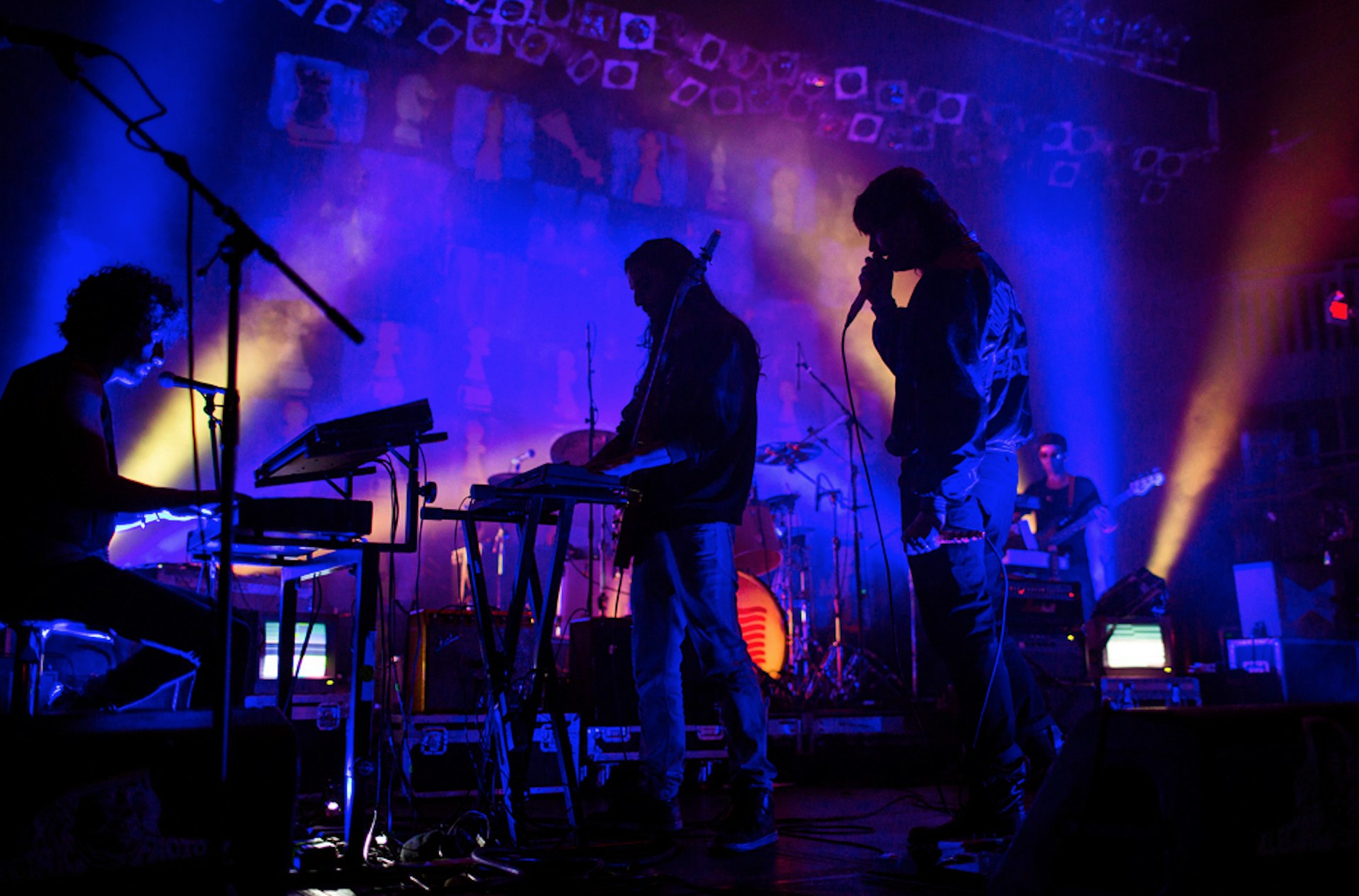
Suburbia
Now clean and sober and happily married, Casablancas has, in a strange inversion of the flow of cool, relocated with his wife and infant child to the dreadfully uncool suburbs of Westchester County. He recently told a reporter that he had always wanted to be like Batman, living in a fortress nearby from which he could swoop into the city with ease. Other comments indicate Casablancas has perhaps given up on the city. He set off internet controversy when he told a reporter that he was sick of going to the Lower East Side and “seeing all of the white people going to brunch”. Yet, in the video for ‘Where No Eagles Fly’, Julian and The Voidz are shown clowning around on Lower East Side rooftops with the timeless backdrop of New York City.
It sounds like you are nostalgic yourself for the way NYC used to be. Do you miss the way the city was? Yeah, for sure. But I think that’s always happened. That bohemian thing that gets moved on. They go to the next crummy neighbourhood and then the wealthy people flock in. Whatever. I think that’s the norm forever. [That brunch quote was from] a friend of mine that I ran into before that interview and I was quoting him. He was at one of these posh new places. There was a huge line — it was like the Kentucky Derby outside. And he was the one who said it to me and I was just repeating it. ‘I can’t deal with all these white people having brunch any more.’
But, Julian, don’t you think all those people having brunch are all Strokes fans? Well, I don’t know. I think it’s just a whole different level of obliviousness that pushes it too far for me. I’m not saying, ‘Fuck those people.’ I’m just saying I wish those people understood what was really happening… People are in the bubble. Maybe it’s because they still rely on the mainstream media — that’s their anchor of what’s happening. But people can’t wrap their head around the fact that mainstream media is not objective. I think that will seep through eventually, hopefully sooner rather than later.
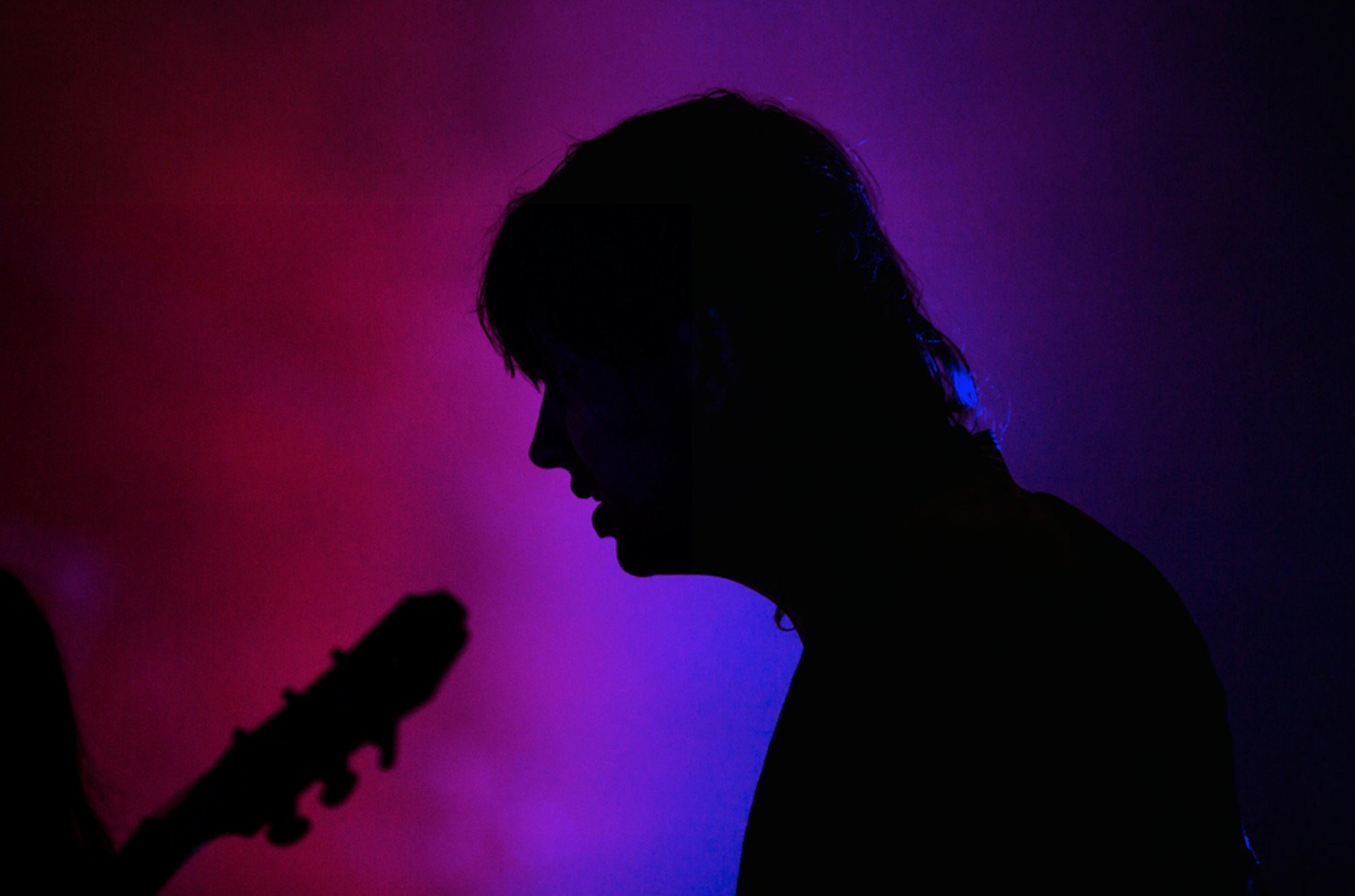
***
For some reason, thinking of Casablancas in the suburbs upstate makes me flash on an image of him from ‘Where No Eagles Fly’ where he is wearing an enormous leather jacket covered entirely in an absurd amount of punk studs, with the word Voidz scrawled in red on its back. In the video, the band is seen playing in what looks like a basement – a right of passage or even a way of life for DIY bands but something The Strokes never did on the way up and something the Voidz will never likely do. I suggest to Casablancas that it’s a funny reversal of sorts, that he had to wait until the brink of middle age to make the snotty, anti-corporate, protest record that most bands make when they’re suburban teens. He appreciates the irony.
“Well, I was in New York when I made it. But I know what you mean. Usually it’s acoustic when you get older,” he laughs. ”It was just something I’ve been striving for — melodically, chordally challenging stuff that maybe sounds catchy. At first, I was worried about people thinking it was too weird so I wrote what I thought people would like. [Then I realised], ‘If I know in my heart what is good and right, then actually people like that more’.”
I am struck here again by how self-conscious Casablancas’ new endeavour is. In interviews, he stresses again and again how he wants the new record to be perceived. He says he released such a long first single, for instance, because he wanted to do something like ‘Bohemian Rhapsody’ or ‘November Rain’. Yet, to Casablancas’ credit, Tyranny with its extreme shifts in style, its whirlpool of influences and epic song lengths, in many ways really is the kind of risky departure he claims it to be. Pitchfork recently suggested Casablancas is “flirting with career suicide”. I ask Casablancas for the first time if he is actually worried about how it will be received.
“I mean, I’m human. I want to be loved. That’s just a natural human thing whether you deny it or not. Maybe if you don’t get love, you say, ‘Fuck it’… There might be elements that people are not familiar with, so maybe it’s a good buffer between them and weirder stuff. You can still have mega slick pop — I’m not against that existing — I’m just against there being zero alternative. The goal is that stuff like this would populate mainstream. And those things might never meet, but I like to think that they will one day.”
I gently suggest to Casablancas that if the record were to become a disastrous flop, that perhaps he would at last, ironically, be set free.
“What do you mean?”
Well, without an audience pre-empting his every move, he’ll be free to do whatever he pleases.
The prospect seems to make him sad and he looks at the floor for a while and then answers quietly.
“It’s not about, ‘When you’re dead and gone’ Or later respect. It would be nice to make it successful. Why not? But then it’s like you said — if it’s not, but we made it and we like it, then so what, we’re happy. I’m not gonna like cry about it. But the goal is to… ”
Take it over?
“Not take it over. But get your foot in the door. So again, it’s the parallel with the whole political thing, and the music thing. That’s what I guess keeps me going. To try to make the mainstream cool.”
It’s time to leave if I am going to make it back to New York City for my other assignment and if Julian is going to catch the first of tonight’s opening acts, Shabazz Palaces. Tonight Casablancas will at last deliver his new vision directly to his fans. I wish him well and tell him, as I get up to go, “Well, one way or the other, after tonight you’ll soon know how it’s going to work out.”
Casablancas looks up at me from the couch with that same kind of mournful look with which he started the interview. He seems genuinely sad when he says, “I’m bummed you’re gonna miss it.”
Tyranny is out now on Cult Records.
Buy Huck 48 – The Julian Casablancas Issue in the Huck Shop, or subscribe to make sure you don’t miss another issue.
Enjoyed this article? Like Huck on Facebook or follow us on Twitter.
